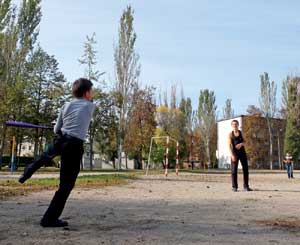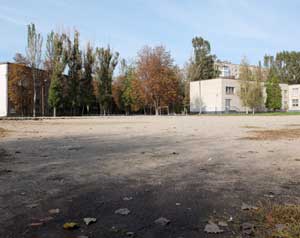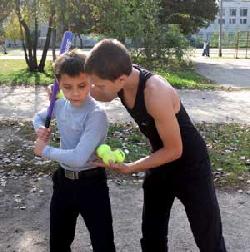|
|||
|
Building community through baseball
1/2/2013 9:25:51 AM
By Jocelyn Stott
Splash Contributor
Indeed, "they" - Ukrainian youth - are already coming out to play baseball. Liberty Lake's Bailey Wolff, a Peace Corp volunteer living in Ukraine, is seeking some hometown help to keep the momentum going.
Wolff has found the game of baseball is a great way to engage a community. The only problem is, he only has a few whiffle and tennis balls, two baseball gloves, a flimsy aluminum bat and more young people showing up to play every day at a "soccer stadium" in the southeastern Ukrainian city of Zaporozhye.
Wolff says the field is more like a dirt lot with weeds surrounded by apartments and some gymnastics or jungle-gym-type equipment.
"None of the Ukraine I've seen has anything like Pavillion Park," he said. "But when kids hear the ting' of the bat, or beata' in Ukraine, they come over to see what it is. You can see in their eyes; they want to play."
He said some young Ukrainians open the windows of their apartments from the complex that overlooks the field in order to observe the game below, where kids propel tennis balls into the distance before running around bases improvised from Frisbees and t-shirts.
Because sporting goods for a relatively obscure sport in Ukraine are hard to come by, Wolff is hoping for hometown help in the form of some extra gear that will enable him to grow the game with the return of spring (see "Sending the gear" on this page).
Wolff played baseball for Central Valley High School and at the club level in college for about a year. He is a 2010 graduate of Eastern Washington University.
After graduating, he was ready for adventure.
"I wanted an experience unlike anything I've ever done before," he said. "I am getting that."
Wolff teaches English at a secondary school called Gymnasium 93, where his students are in seventh, eighth and tenth grades.
According the Peace Corps website, the Ukraine began welcoming Peace Corp volunteers in 1992 following the dissolution of the Soviet Union in 1991. Peace Corp volunteers like Wolff teach English and work on projects in youth and community development. Oh, and in this case, they also teach a little baseball - which ties into the Peace Corps mission of promoting sports, health and wellness.
 Submitted photos Boys enjoy pitching and catching at a lot in Zaporozhye, Ukraine. The baseball experience came about when Bailey Wolff, a Peace Corps volunteer and Liberty Lake native teaching English at a nearby school, was asked by his students to teach them the game. |
 The lot where the students play baseball is surrounded by apartments. It is normally used for soccer and for its playground equipment. Sending the gear Peace Corp volunteer and Liberty Lake native Bailey Wolff is currently serving in Zaporozhye, Ukraine, where the game of baseball is attracting attention. Wolff hopes to gather enough gear for a weekly or twice-weekly game with kids from the school where he teaches - and whoever else wants to play. Interested local residents can make donations through Wolff's parents, Jamie and Jackie Wolff. Call Jamie Wolff (927-9700) or Jackie Wolff (927-9701) to arrange a drop off. The needs include: Bats Gloves (mostly right-handed) Incrediballs, baseballs and softballs Helmets Extras that would be nice: Batting tee Catching gear Bases Baseball hats (especially with American teams on them) Wolff says adult sizes are best because the age range of most of the kids who play is 11 and older, and these kids can make due with adult-size gear more easily than children's sizes. |
"I love baseball. And I am in their country. I am their guest. I do what people ask me to do here," Wolff said.
So baseball it is.
One of the boys Wolff teaches, Nikita, had a toy souvenir bat about 18 inches long that he brought to play, and Wolff explained to the boy that it wouldn't work. So they found a flimsy aluminum bat that Wolff is afraid to hit with a real baseball for fear it would break. So far, most of what the Ukrainian kids know of baseball is hitting.
"No one wants to stand in a field to retrieve tennis balls," Wolff said.
Indeed, some of the American pastime's finer intricacies may take some getting used to in order to appreciate.
"I'd say that Ukrainians see baseball as a complicated game where a lot of people stand around doing nothing," Wolff said.
Wolff said the majority of the young people who know something about baseball, saw it in a movie or online video.
"In America, playing catch is something people do from a young age," he said. "I never realized before trying to throw and catch with these kids how it is actually a skill. For them, every movement is new and awkward."
Needless to say, some genuine baseball gloves might make fielding a bit more fun - not to mention necessary to teach the game correctly.
Teaching the game has been a great challenge for his Ukrainian-to-English communication skills. Wolff said he found a Russian video online that he has used as a teaching aid.
Wolff and another friend also hope to organize some softball for adults, both in his host city and others. The pair has met with future physical education teachers at the university level to explain their vision.
"Our hope is that if we can interest them in the game, then when they go back to their respective schools, they will teach it to their students," Wolff said.
One thing Wolff has learned about Ukrainian youth is they don't know about "real" American culture, and he has likewise learned much more about them as well.
" They are just like people in America, or perhaps, people everywhere," Wolff said. "They are individuals with beautiful talents, dreams and hopes for themselves."



